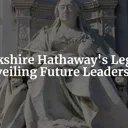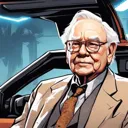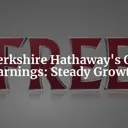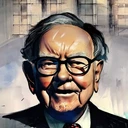Tags: History / Warren Buffett / Charlie Munger
This fanpage is not officially affiliated with Berkshire Hathaway: Disclaimer
Dive into the fascinating world of Warren Buffett and Charlie Munger's maverick minds as they navigate through economic downturns, strategic acquisitions, and bold investments. Learn valuable lessons about independent thinking, long-term value creation, and leadership during times of crisis.
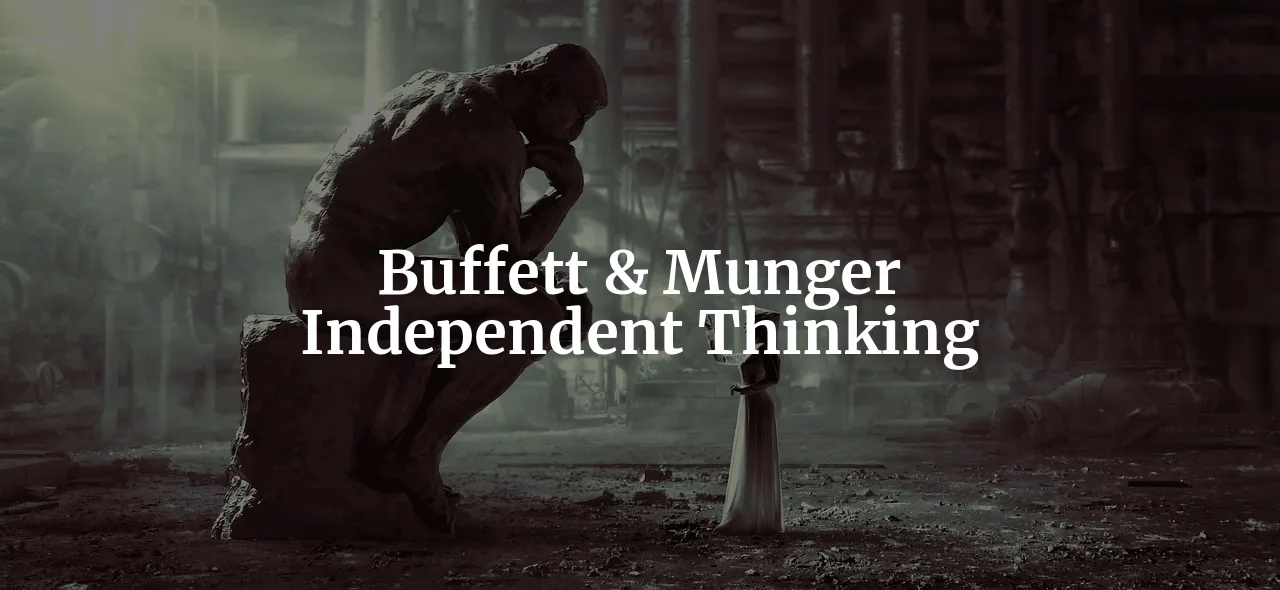
Introduction
In the annals of corporate America, few stories are as compelling as the transformation of Berkshire Hathaway from a struggling textile manufacturer into a global conglomerate powerhouse under the stewardship of Warren Buffett and Charlie Munger ↗. Since 1965, this dynamic duo has steered the company through turbulent markets and economic downturns, achieving unparalleled success ↗. Central to their strategy has been an unconventional decision-making process that often eschewed short-term market trends in favor of long-term value creation 1.
This article aims to explore the essence of independent thinking in leadership, drawing parallels between the maverick minds of Buffett and Munger and those of historical figures like Pericles of ancient Athens and Abraham Lincoln. These leaders, though separated by centuries and contexts, share a common thread in their ability to navigate through public opinion and market trends to make fundamentally sound, future-oriented decisions.
We will delve into specific case studies where Buffett and Munger's independent thinking not only deviated from the mainstream but also led to substantial gains for Berkshire Hathaway. By understanding the historical context and innovative approaches to leadership and decision-making, we can appreciate the mental fortitude and strategic acumen that contributed to Berkshire Hathaway's growth.
Join us as we dissect the unconventional decisions of Buffett and Munger, paralleling their investment success with visionary leadership from history, setting the stage for a deep dive into the minds that have shaped our world and economy.
To commence, let's delve into the profiles of two exceptional leaders renowned for their capacity to think independently, alongside a myriad of other defining traits, which have indelibly shaped their respective nations.
Pericles: Visionary Leadership in Ancient Athens
Pericles, a statesman, orator, and general, was at the helm of Athens during its Golden Age, a period marked by unprecedented cultural and architectural achievements. Born in 495 BCE into an influential family, Pericles was educated by leading minds and began his political career in the 460s BCE. His leadership saw Athens through its peak, overseeing the construction of the Parthenon and fostering a cultural landscape where artists, playwrights, and philosophers thrived 8.
Under Pericles' guidance, Athens embarked on innovative public works and democratic reforms. His vision for democracy was not just about expanding citizen participation in governance but also about ensuring that participation was meaningful. By introducing pay for public officials and jurors around 450 BCE, Pericles democratized the political system, making it accessible to all, regardless of economic status. This move not only emphasized the idea of 'isonomia' or equality before the law but also championed the assembly (ekklesia) as the central decision-making body of Athens 8.
Parallel to Pericles' efforts in enhancing democracy, Warren Buffett and Charlie Munger have shown a similar dedication to long-term investment in value, often going against the grain of popular opinion. Just as Pericles funded the construction of the Parthenon, showcasing his ability to inspire investment in long-term cultural assets, Buffett and Munger have made strategic decisions during economic downturns that have paid off significantly for Berkshire Hathaway.
Pericles' handling of the Plague of Athens highlights his steadfast leadership during a crisis. Despite the profound social and political impact of the plague, which claimed the lives of one-third of the population, including Pericles' own sons, his leadership remained unwavering. This scenario mirrors Buffett and Munger's navigation through economic crises, maintaining strategic focus amidst adversity 8.
Moreover, Pericles' approach to public opinion, where he maintained strategic focus despite criticism, is reminiscent of Buffett and Munger's ability to hold firm to their investment principles, even when they appear to be out of step with the prevailing market sentiment.
Pericles' independent thinking and long-term vision not only set the stage for Athens' enduring legacy but also offer valuable lessons in leadership and decision-making. His ability to inspire a city-state towards greatness, despite challenges, mirrors the strategic acumen of Buffett and Munger, who have similarly steered Berkshire Hathaway to unparalleled success through their maverick decisions. Quite frankly, isn't Berkshire Hathaway in a Golden age ever since Warren took over the company due to Seabury Stanton breaking his promise ↗?
Nevertheless, let's now direct our attention to another illustrious leader whose indomitable will and remarkable mental acumen profoundly influenced the destiny of the United States: Abraham Lincoln.

Abraham Lincoln: Leadership Through Turmoil
Abraham Lincoln's ascent from his humble roots to becoming a pivotal leader during one of America's most divisive periods is a testament to his unwavering commitment and political acumen. Born to a poor family in Kentucky, with no formal education, Lincoln's thirst for knowledge was insatiable. He borrowed law books to study by himself, laying the foundation for his future as a skilled attorney and politician 9. This self-taught knowledge not only equipped him with the tools necessary for his legal career but also instilled in him the discipline and emotional intelligence required for leadership.
Lincoln's political journey was fraught with failures and setbacks, yet these experiences contributed to his wisdom, resilience, and empathy—qualities that would define his presidency. Despite the unpopularity of his stance on slavery, Lincoln focused on the moral issue at its core, understanding the transformational change required to address the complexity and magnitude of the stakes involved 9. His strategic decision to prioritize the abolition of slavery, despite the immense risk it posed to his political career, underscores his ethical leadership and commitment to the nation's moral landscape.
The Gettysburg Address stands as a powerful example of Lincoln's ability to connect current efforts to the history and future of the enterprise. In just 272 words, he redefined the purpose of the Civil War, linking it to the broader ideals of freedom and democracy. This speech not only commemorated the fallen soldiers but also reinvigorated the Union's cause, emphasizing the importance of perseverance despite the costs 9.
Lincoln's hands-on approach to learning military strategy and his management of military leaders further draw parallels to Warren Buffett's method of understanding business operations. Like Buffett, Lincoln was not afraid to immerse himself in the details of his domain, teaching himself military strategy to better lead the nation through the Civil War. His frequent visits to General McClellan to discuss military inaction and his eventual realization that Union victory depended on exploiting resources highlight his proactive and involved leadership style 9.
Despite facing public criticism and personal challenges, including the loneliness and isolation that came with his heavy responsibilities, Lincoln's perseverance and strategic communication with the public and his opponents were instrumental in maintaining focus on long-term goals. His ability to engage with challengers, mitigate opposition, and avoid potential derailment of reform efforts was crucial in preserving the Union and transforming the nation's moral landscape 9.
Lincoln's leadership through turmoil was characterized by his independent thinking, ethical leadership, and an ongoing commitment to self-improvement and moral seriousness ↗. His story is not just one of personal triumph but also a reminder of the transformative power of leadership that is committed to the future consequences and rejects ethical callousness.
Navigating the Dot-Com Bubble
The late 1990s dot-com bubble was a period marked by a speculative frenzy, with internet stocks trading at unprecedented levels, tech IPOs becoming commonplace, and day trading gaining popularity. Amidst this speculative atmosphere, Warren Buffett and Charlie Munger made the unconventional decision to steer clear of investing in tech companies, despite their soaring valuations. This decision was rooted in their focus on long-term value rather than succumbing to the short-term trends that characterized the era 2.
The aftermath of the bubble's burst vindicated Buffett and Munger's cautious approach. While Berkshire Hathaway's performance lagged during the height of the bubble—down 44% compared to the Nasdaq's 145% rise—the market correction that followed saw their performance improve significantly as the Nasdaq collapsed. This period underscored the importance of understanding market dynamics and investor psychology, with Buffett and Munger navigating through the speculative stocks' impact on the market with a focus on value investing 2.
The research on speculative stocks during this period provides a backdrop for understanding the psychological and market dynamics that Buffett and Munger navigated ↗. Studies conducted showed that the presence of speculative assets could depress the prices for value assets and increase their volatility. This aligns with Buffett and Munger's experiences during the dot-com bubble, where their value-based investments faced short-term underperformance amidst the speculative frenzy 2.
Despite the challenges, specific examples of Berkshire Hathaway's investments during this period highlight their commitment to value investing. While the prevailing trend was towards tech investments, Buffett and Munger's focus remained on companies with solid fundamentals and long-term growth potential. This approach not only allowed them to navigate the dot-com bubble successfully but also provided valuable lessons on market speculation, investor psychology, and the enduring importance of value investing.
The dot-com bubble serves as a powerful reminder of the strength of independent decision-making in the face of market euphoria. Buffett and Munger's ability to adhere to their investment principles, despite the overwhelming momentum of speculative assets, underscores the significance of their unconventional decisions during this tumultuous period. Their experiences during the dot-com bubble highlight the importance of maintaining a long-term perspective and the value of cautious, informed investing in navigating market bubbles and bursts. Let us investigate this scheme a little more abstract in the next section.
Thriving in Bear Markets
Warren Buffett, has long been celebrated for his uncanny ability to navigate the tumultuous waters of the stock market with a seemingly prescient acumen. His philosophy on bear markets, as opportunities to acquire undervalued assets, has been a cornerstone of his investment strategy. According to Buffett, downturns in the market are not to be feared but embraced as they present the chance to buy good companies at reasonable prices 3.
Buffett's approach during these periods is characterized by a selective contrarian investment strategy. He zeroes in on industries and companies boasting durable competitive advantages, making concentrated purchases of solid businesses at prices that promise long-term value. This methodology stands in stark contrast to the broader market's reaction to downturns, which is typically marked by panic selling and short-term thinking.
One of the most illustrative examples of Buffett's philosophy in action was his avoidance of the tech sector during the dot-com boom as we have seen. While many investors were drawn to the skyrocketing valuations of tech companies, Buffett steered clear, citing a lack of performance history and the absence of a durable competitive advantage in many of these firms. This calculated decision was rooted deeply in his investment criteria, emphasizing earnings trends, debt ratios, and returns on invested capital 3.
The psychological and strategic discipline required to invest counter to market trends is not trivial. Buffett's and also Munger's ability to maintain their focus on the long-term potential of investments, rather than being swayed by short-term market movements, has been a key factor in Berkshire Hathaway's sustained growth and resilience. Berkshire's bear market strategies, which often involve securing stock with assured dividends and future stock warrants at below-market prices, reflect a deep understanding of market cycles and an unwavering confidence in the underlying investment philosophy.
The broader implications of Buffett's approach during bear markets offer valuable lessons for investors aiming to emulate his success. It underscores the importance of patience, thorough analysis, and a focus on fundamental value over market sentiment. For Berkshire Hathaway shareholders, it's a reminder of the strength of the conglomerate's investment strategy, capable of thriving even in the most challenging market conditions.
Buffett's perspective on the 2008 financial crisis was elucidated in a Wall Street Journal interview conducted in 2018. This discussion not only delves into his overarching market philosophy but also addresses crucial topics such as market bubbles and crises. Understanding his insights on these matters becomes particularly pertinent when contextualized within the framework of the BNSF acquisition in the aftermath of the financial downturn, a topic we will delve into further in the subsequent section.
The Strategic Acquisition of BNSF
In the wake of the financial crisis, Warren Buffett made a strategic move that would further solidify Berkshire Hathaway's position as a conglomerate with a keen eye for long-term value. The acquisition of Burlington Northern Santa Fe (BNSF) in 2009 for $29 billion in cash and stock was a testament to Buffett's ability to identify and capitalize on essential industries with enduring value 4.
Buffett's decision to invest in the railroad industry was driven by a recognition of the long-term importance and essential nature of rail transport. Railroads are more fuel-efficient than trucks and play a crucial role in the economy, transporting a significant portion of goods across the country. Despite the capital-intensive nature of the business, Buffett understood the importance of earning power and Return on Invested Capital (ROIC), which are critical in such industries 4.
Following Berkshire Hathaway's acquisition, BNSF underwent significant financial and operational improvements. The railroad's focus on freight, including consumer products, industrial products, agricultural products, and coal, allowed it to maintain a steady source of revenue, with total freight revenue reaching $24.49 billion in 2021. Moreover, BNSF's revenue mix has evolved over the years, with consumer products increasing to 38% in 2022, reflecting the railroad's adaptability to changing market demands 4 ↗↗.
The financial outcomes of the acquisition have been impressive. BNSF has generated more than $90 billion in operating income and $65 billion in net income since Berkshire's acquisition. It has also produced significant cash flow, generating around $90 billion from operating activities and distributing more than $50 billion to Berkshire. These figures underscore the acquisition's success, not only in terms of operational performance but also in generating returns for Berkshire Hathaway 4 ↗.
The strategic advantages of rail transport, such as its fuel efficiency and essential role in the economy, coupled with the operational and financial improvements at BNSF, exemplify Buffett and Munger's ability to identify long-term trends and value. The BNSF acquisition is a prime example of their investment philosophy in action, highlighting their skill in making strategic decisions that pay dividends well into the future.
Investing in Coca-Cola During Negative Sentiment
In the late 1980s, amidst a backdrop of skepticism and negative market sentiment, Berkshire Hathaway, under the astute leadership of Warren Buffett and Charlie Munger, made a seemingly contrarian decision to initiate a significant stake in Coca-Cola ↗. This decision, made between late 1988 and early 1989, involved acquiring a 6.3% stake which eventually grew to 8.8% due to share repurchases 5. At the time, this move was met with raised eyebrows, as it diverged from the prevailing market trends that favored high-tech and rapidly growing sectors.
The factors that Buffett and Munger considered while evaluating Coca-Cola were deeply rooted in their investment philosophy, which emphasizes fundamental value over market sentiment. They saw in Coca-Cola a company with a powerful brand presence, consistent revenue and earnings growth from 1979 to 1988, and a sustainable mid-teens return on assets alongside a solid 25% to 30% return on equity with limited leverage 5. Furthermore, the balance sheet data for year-end 1988, showcasing $1.23 billion in cash & equivalents against a total debt of $760 million, painted a picture of financial health and stability 5.
The investment in Coca-Cola has since generated long-term growth and substantial returns for Berkshire Hathaway, reinforcing the wisdom of Buffett and Munger's focus on fundamental value ↗. This move is emblematic of their investment strategy, which often involves going against the grain of market trends to identify undervalued companies with strong fundamentals.
The significance of this investment extends beyond its financial returns; it serves as a case study in value investing, demonstrating the importance of brand value, global market dominance, and a long-term investment horizon. Buffett and Munger's independent thinking, evidenced by their decision to invest in Coca-Cola amidst negative sentiment, underscores a critical lesson in investing: the value of contrarian perspectives and the courage to act on them.
Exploring New Frontiers: Investment in Japanese Trading Houses
In a strategic pivot towards diversification and exploring new markets, Berkshire Hathaway, in 2020, announced its investment in Japan's top five trading firms, raising its stake to around 9% 6 ↗. This move marked a significant foray into the Japanese market, known for its unique business models and economic landscape. The trading houses - Mitsubishi, Itochu, Mitsui & Co., Sumitomo, and Marubeni - represented a blend of traditional and modern business practices, offering a unique opportunity for Berkshire Hathaway to tap into Japan's economic potential:
The financial outcomes of this investment have been noteworthy, with Berkshire Hathaway's stakes, initially acquired for ¥1.6 trillion ($10.63 billion), appreciating to ¥2.9 trillion by the end of 2023, translating into unrealized gains of 61% or $8 billion 6. This strategic increase in stake underscores Buffett and Munger's confidence in the long-term potential of these trading houses and their commitment to holding these investments over an extended period.
This move is reflective of Buffett and Munger's willingness to venture into new markets and diversify Berkshire Hathaway's investment portfolio beyond its traditional scope. It highlights their long-term perspective and patience, qualities that are indispensable for investments in foreign markets, which may require extended timeframes to realize their full potential.
The investment in Japanese trading houses also has broader implications for Berkshire Hathaway's global investment strategy. It signifies an openness to international investment opportunities and underscores the importance of independent research and analysis in identifying value in less familiar territories.
Both the investment in Coca-Cola during a period of negative sentiment and the strategic foray into Japanese trading houses exemplify the maverick minds of Buffett and Munger. These decisions, rooted in a deep understanding of value investing and an unwavering commitment to independent thinking, offer enduring lessons in brand value, market dominance, diversification, and the virtues of a long-term investment horizon.
The Goldman Sachs Bailout: Opportunistic Investing During Crisis
As we have discussed, the 2008 financial crisis was a period of unprecedented turmoil in global financial markets, with many venerable institutions facing severe liquidity crises. Amidst this chaos, Warren Buffett's Berkshire Hathaway made a bold move that would not only bolster one of Wall Street's titans but also yield a significant return on investment. This section delves into the Goldman Sachs bailout by Berkshire Hathaway, a masterstroke of opportunistic investing during a crisis.
In September 2008, the collapse of Lehman Brothers sent shockwaves through the financial system, leading to a severe crisis of confidence. Banks were hesitant to lend to each other, and the credit markets were effectively frozen. Goldman Sachs, although better positioned than many of its peers, was not immune to the crisis. It was in this context that Berkshire Hathaway stepped in with a $5 billion investment in Goldman Sachs 7. This move was not just a bailout but a vote of confidence in the bank's future.
The Terms of the Deal and Buffett's Strategic Thinking. The terms of the deal were highly favorable to Berkshire Hathaway. Buffett negotiated the purchase of preferred stock with a hefty dividend yield. Specifically, Berkshire Hathaway received a $500 million premium for the preferred stock and $1.2 billion in dividends over the life of the investment ↗. Additionally, in March 2011, Goldman redeemed Berkshire's shares at a 10% premium, adding another $500 million to the returns 7.
Warren Buffett's decision to invest in Goldman Sachs was driven by his ability to see beyond the immediate crisis. Recognizing the intrinsic value and the fundamental strength of Goldman Sachs, Buffett saw an opportunity where others saw only risk. This move was not merely financial; it was also symbolic, sending a strong message that Goldman Sachs was a sound investment even in the most challenging times.
Before Berkshire sold its Goldman stake, Warren Buffett gave an inspiring speech at the 2018 Small Business Summit at Goldman Sachs. The speech is not particularly related to the investment in Goldman, but it may show the solidary partnership between Berkshire and Goldman at that time:
Outcomes of the Bailout for Berkshire Hathaway. The financial outcome of the bailout for Berkshire Hathaway was extraordinarily positive. The total return on the investment exceeded $3 billion, including the premiums, dividends, and proceeds from the sale of most of its stock in the bank. By Q4 2019, Berkshire had reduced its holding in Goldman by more than a third, and by the following quarter, by more than 80%, cashing out about $1.4 billion from stock sales. Despite these sales, Berkshire Hathaway still held 1.9 million Goldman shares worth $340 million at the end of March 2020 7. These remaining shares were sold in Q2 2020 10.
The successful bailout of Goldman Sachs significantly enhanced Berkshire Hathaway's reputation and influence in the financial sector. It underscored Buffett's role not just as an investor but as a stabilizing force in times of financial distress. The move demonstrated Berkshire's ability to provide not just capital but also confidence, reinforcing its position as a cornerstone of the American financial system.
This decision exemplified Buffett's approach to risk management and opportunistic investing. By carefully selecting investments in companies with strong fundamentals and negotiating favorable terms, Buffett managed to minimize risk while positioning Berkshire Hathaway to benefit from the eventual market recovery. This approach highlights the importance of understanding market cycles and having the courage to invest during periods of uncertainty.
Lessons from the Goldman Sachs Bailout Regarding Crisis Management, Strategic Investing, and the Importance of Financial Stability. The Goldman Sachs bailout offers several key lessons for investors and business leaders alike. It demonstrates the importance of crisis management, the value of strategic investing based on fundamental analysis, and the critical role of financial stability in sustaining confidence in the economic system. For Berkshire Hathaway's shareholders, this episode is a testament to the acumen of Buffett and Munger, showcasing their ability to navigate through crises with foresight and strategic thinking.
Overall, the Goldman Sachs bailout by Berkshire Hathaway during the 2008 financial crisis stands as a landmark event in the annals of financial history. It not only yielded a significant return on investment but also reinforced the principles of opportunistic investing and the importance of leadership during times of turmoil. For investors and business leaders, the lessons from this episode remain as relevant today as they were then, offering insights into the art of navigating through crises with strategic foresight and unwavering confidence.
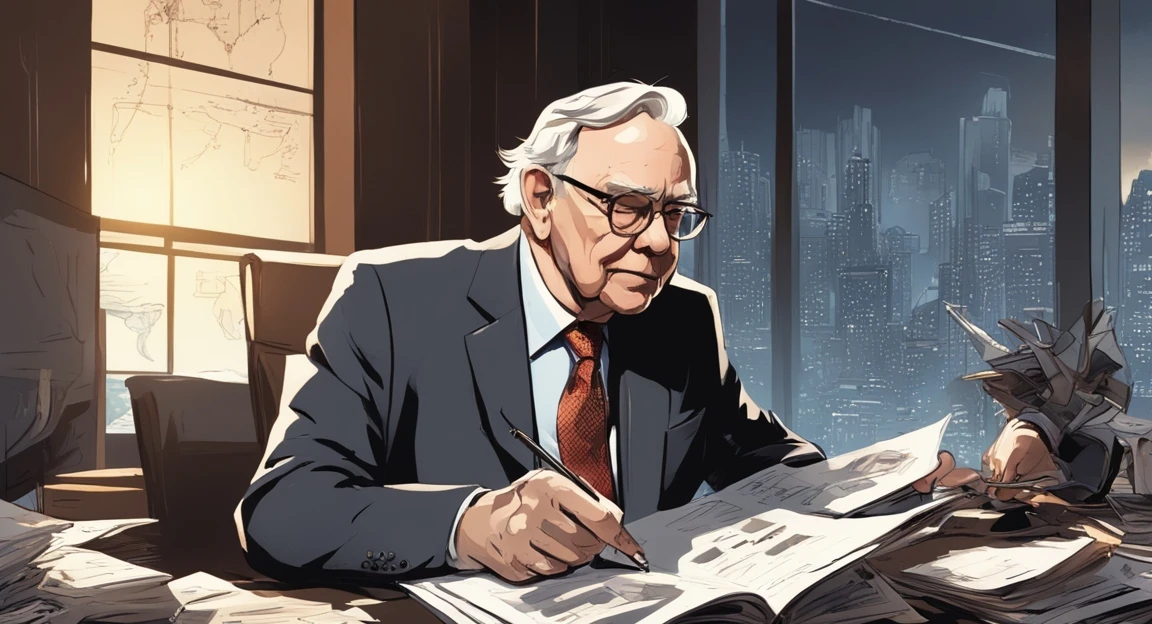
Conclusion
The maverick minds of Warren Buffett and Charlie Munger have left an indelible mark on Berkshire Hathaway and the investment world at large. Their unconventional decisions, rooted in independent thinking, strategic acumen, and a steadfast commitment to long-term value creation, have set them apart as visionary leaders in a landscape often dominated by short-term trends and market volatility.
Drawing parallels between the leadership styles of historical figures like Pericles and Abraham Lincoln, we see a common thread of unwavering dedication to principles, strategic foresight, and the ability to navigate through challenges with resilience and vision. Pericles' visionary leadership in ancient Athens and Lincoln's steadfast commitment during the Civil War mirror Buffett and Munger's ability to steer Berkshire Hathaway through economic downturns and market fluctuations with a focus on enduring value.
The dot-com bubble, bear markets, strategic acquisitions like BNSF, and investments in Coca-Cola and Japanese trading houses all showcase Buffett and Munger's ability to make bold decisions that pay off in the long run. Their strategic foresight, patience, and unwavering commitment to fundamental values have not only propelled Berkshire Hathaway to unparalleled success but also offer valuable lessons for investors and business leaders seeking to emulate their success.
The Goldman Sachs bailout during the 2008 financial crisis stands as a testament to Buffett's opportunistic investing and risk management strategies. This move not only yielded significant returns for Berkshire Hathaway but also reinforced the importance of crisis management, strategic investing, and financial stability in times of turmoil. The lessons from this episode underscore the enduring legacy of Buffett and Munger's leadership, offering insights into navigating through crises with foresight and confidence.
As shareholders of Berkshire Hathaway, it is imperative to reflect on the key themes of independent thinking, strategic decision-making, and long-term value investing that define Buffett and Munger's leadership. Embracing these principles in our own decision-making processes can lead to lasting success and resilience in the face of market volatility and uncertainty. Let us heed the lessons from the maverick minds of Buffett and Munger, embracing independent thinking and strategic patience in our pursuit of enduring value and success in the investment world.
References
-
Berkshire Hathaway - Wikipedia - en.wikipedia.org ↩
-
Why Did Warren Buffett Struggle During the Dot Com Bubble? — Steemit - steemit.com ↩↩↩
-
Warren Buffett's Bear Market Maneuvers - www.investopedia.com ↩↩
-
Riding The Rails Of Profit: The Returns Berkshire Had From BNSF - seekingalpha.com ↩↩↩↩
-
Revisiting Buffett / Coca-Cola in 1988 - www.gurufocus.com ↩↩↩
-
Buffett ups his holdings of Japanese trading houses to about 9% - www.japantimes.co.jp ↩↩
-
Warren Buffett's Berkshire Hathaway raked in more than $3 billion from its Goldman Sachs bailout - markets.businessinsider.com ↩↩↩
-
Pericles' visionary leadership of ancient Athens at the height of its power - www.historyskills.com ↩↩↩
-
The leadership journey of Abraham Lincoln - www.mckinsey.com ↩↩↩↩↩
-
Berkshire Hathaway's Goldman Sachs Group Stake - stockcircle.com ↩

